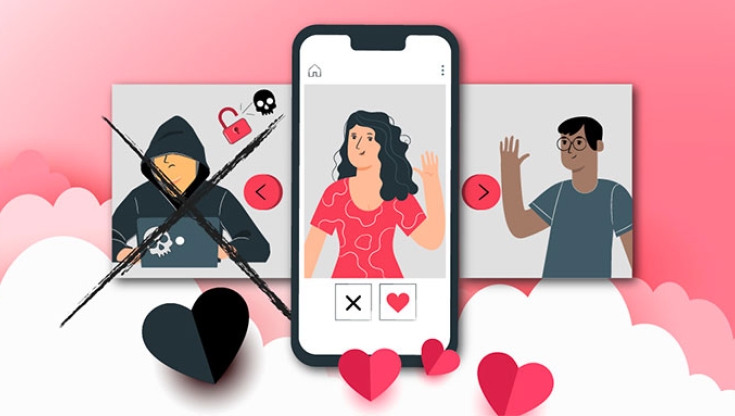This Valentine’s Day, Swipe Left on Hackers

This post was updated on 2/13/2023
Online dating is one of the fastest-growing industries in the tech world. Online dating has quickly become a sustainable way to remain social and have a relationship with someone other than your cat. But what are the chances that you’ll be swiping right on a hacker? Mobile analytics platform, Adjust, reports that in 2021, 300 million adults used dating apps worldwide with 20 million users paying for premium features. In 2021, estimates say the dating app market made $5.61 billion in revenue, and in fact, this market is expected to exceed $8.4 billion by 2024.
Unfortunately, Valentine’s Day is yet another event where those looking for virtual meet-cutes can be exposed to an undesirable encounter. When exploring the online dating world, try to be mindful of who you interact with and how much personal information you share. Below are four ways to keep romance scammers away.
Catfishing or fishing for love?
Scammers can use stolen personal information or create a fictional identity to target victims to present themselves as someone they are not. If they seem more interested in your demographics (where you live, where you work, if you live alone) instead of asking how many breads you’ve baked since the pandemic started, that could count as a catfisher-alert type of red flag.

Keep personal and employee accounts separate
Avoid the risk of introducing vulnerabilities into your workplace by using the same personal account in your dating app profile for work-related activities. Things could escalate very quickly if along with stealing your information (or money), a hacker also gets to access your company’s network.
Share the love, not your password
An oldie, but a goodie. We are all struggling to remember our passwords and sometimes we fall into the trap of using the same one or storing it in insecure ways, which can unintentionally make it easy for a scammer to catfish using your identity or hacking into your personal and financial accounts.
Dating apps have a lot to offer and it’s another example of how apps are becoming so central to lifestyle choices. But undoubtedly, this raises the possibility to be more exposed to being hacked. So, by all means, go mingle and swipe left and right. Just remember mama’s good old advice: focus on the manners and talk on the phone.
If you would like to learn more about protecting personal information, check out this post.
Protect your credentials and devices
The more we integrate technology into our lives, the more we need to adopt new habits to help us stay clear from security threats. If your dating site offers multi-factor or two-factor authentication, enable it as a way to verify your identity before logging in. Since passwords are a common entry point for malicious actor, consider using a password manager as an extra way to securely store them.


